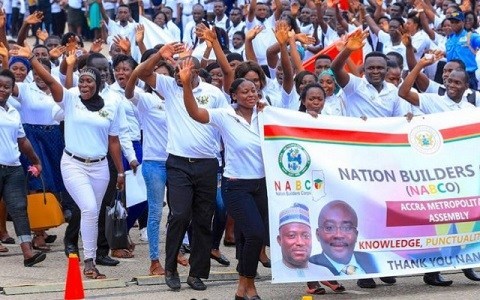The Ministry of Chieftaincy and Religious Affairs has directed its registrars to relieve all Nation Builders Corps (NABCo) trainees attached to the ministry of their duties.
The move comes despite assurances by the government that trainees of NABCo will be retained at their various organisations.
The Chieftaincy Ministry insists that the trainees had completed their programme in October 2021 and should be shown the exit.

An earlier statement signed by the NABCo boss Dr Ibrahim Anyars on 15 November 2021 assured that trainees would not be sacked.
“Following a high-level stakeholder meeting with the lead NABCo Module Implementation Partners (MIPs) led by His Excellency, the Vice President of the Republic of Ghana and the Honourable Chief of Staff, all NABCo trainees are required to remain at post,” he stated.
Again, the Minister of Finance, Ken Ofori Atta, said in his presentation of the 2022 budget statement and economic policy in Parliament on Wednesday, 17 November 2021, that the over 67,000 trainees would not be laid off.
Mr Ofori-Atta said a ‘YouStart programme’ and a ‘Digital Inclusion Programme’ would gradually absorb them in batches during the next fiscal year.
According to him, through the initiative, the government will support the beneficiaries to gain access to capital, training, technical skills, and mentoring to enable them to launch and operate their own businesses.
“The NABCo programme was designed as a temporary stepping stone for young graduates for a period of three years. In the last three years, 100,000 young graduates have benefitted from the NABCo programme.
“With over 33,000 trainees already securing jobs, the government will work to ensure that the remaining NABCo trainees are effectively supported to take advantage of the opportunities’ YouStart’ presents,” he assured.
However, the position of the Chieftaincy Ministry seems contrary to the finance minister’s assurances.
The Nation Builders Corps (NABCo) programme is a government initiative implemented to address the growing phenomenon of graduate unemployment.
The focus is to solve public service delivery in health, education, agriculture, technology, governance, and driving revenue mobilisation and collection.
The objectives of the programme are to:
• Provide temporary employment to unemployed graduates
• Improve skills and employability for the transition from program to permanent employment
• Improve public service delivery
• Improve on government revenue mobilisation
• To provide needed infrastructure to improve access to basic public services
Under the programme, graduates are expected to be trained, equipped with the necessary work tools, and deployed around the country to engage in the following programmes:
• Educate Ghana
• Heal Ghana
• Feed Ghana
• Revenue Ghana
• Digitise Ghana
• Civic Ghana
• Enterprise Ghana



